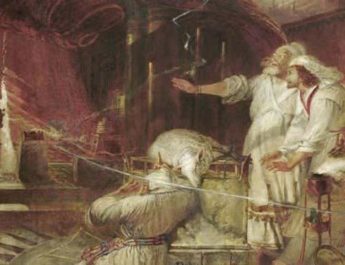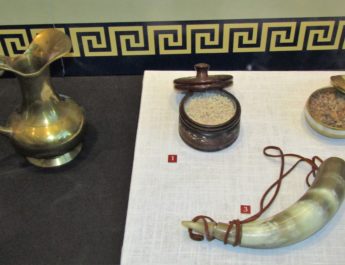1 Samuel 17:57-18:5, 10-16
Ordinary B30
17:57 On David’sA returnB from killingC the Philistine,D
A “David’s” = David. From the same as dod (beloved, love, uncle); the root may mean to boil, which is used figuratively to describe love. So, this implies someone you love such as a friend, a lover, or a close family member like an uncle. David’s name likely means something like “beloved one.”
B “return” = shub. To turn back, return, turn away – literally or figuratively. Doesn’t necessarily imply going back to where you started from. This is also the root verb for the Hebrew word for repentance “teshubah.”
C “killing” = nakah. This is to hit whether lightly or severely. It can be used in a literal or figurative sense. So, this could be beat, punish, give wounds, kill, or slaughter.
D “Philistine” = Pelishti. From Pelesheth (Philistia); from palash (to mourn, wallow, maybe roll in). This is Philistines. Their name may mean “griever” or “burrower” or “weakener.” See https://www.abarim-publications.com/Meaning/Philistine.html.
AbnerE tookF him and broughtG him beforeH Saul,I
E “Abner” = Abner. From ab (father in a literal or figurative sense – grandfather, chief, ancestor) + ner (properly, to glisten; a lamp, light, burner, candle; light literal or figurative). This is Abner, a name meaning “my father is a lamp,” “father of light,” “enlightening.”
F “took” = laqach. This is to take, accept, carry away, receive. It can also have the sense of take a wife or take in marriage.
G “brought” = bo. This is to enter, come in, advance, fulfill, bring offerings, enter to worship, attack. It can also have a sexual connotation.
H “before” = paneh. From panah (to turn, face, appear). This is face in a literal or figurative sense. It could be face, presence, anger, respect. It can also be used of God to indicate divine favor or presence.
I “Saul” = Shaul. From shaal (to ask, inquire, beg, borrow, desire, request; can also mean demand). This is Saul or Shaul, meaning “asked of the Lord.”
with the headJ of the Philistine in his hand.K 58 Saul said to him, “Whose sonL are you, young man?”M
J “head” = rosh. This may come a word that means to shake. It is the head, captain, or chief. It can also be excellent or the forefront. It can be first in position or in statue or in time (i.e. the beginning).
K “hand” = yad. This is hand, ability, power. Hand in a literal sense, but also what one can do or the means by which one does it.
L “son” = ben. From banah (to build or obtain children). This is son, age, child. It is son in a literal or figurative sense.
M “young man” = naar. May be from na’ar (to shake, toss up and down, tumble around). This is a child or a servant. It is a child in their active years so they could be aged anywhere from infancy to adolescence.
And David answered, “I am the son of your servantN JesseO the Bethlehemite.”P
N “servant” = ebed. From abad (to work, serve, compel; any kind of work; used causatively, can mean to enslave or keep in bondage). This is a servant, slave, or bondservant.
O “Jesse” = Yishay. Perhaps from ish (man); {perhaps from enosh (human, humankind, mortal); from anash (to be weak, sick, or frail)} OR from the same as yesh (being, existence, substance). This is Jesse, a name which means “my husband” or “the Lord exists.” See https://www.abarim-publications.com/Meaning/Jesse.html
P “Bethlehemite” = Beth Hallachmi. Related to “son” in v17:58. 4x in OT. From beth lechem (Bethlehem); {from bayit (house, court, family, palace, temple); {probably from banah (see note L above)} + lechem (bread, food, loaf; food for people or for animals); {from lacham (to eat, feed on; figuratively, to battle as a kind of consumption/destruction)}. This is a resident of Bethlehem.
18:1 QWhen David had finishedR speakingS to Saul,
Q {untranslated} = hayah. This is to be or become, to happen.
R “finished” = kalah. This is to end, be finished, complete, prepare, consume, spent, or completely destroyed.
S “speaking” = dabar. This is generally to speak, answer, declare, or command. It might mean to arrange and so to speak in a figurative sense as arranging words.
the soulT of JonathanU was boundV to the soul of David, and Jonathan lovedW him as his own soul.
T “soul” = nephesh. Related to naphash (to refresh or be refreshed). This is soul, self, person, emotion. It is a breathing creature. Can also refer to appetites and desires.
U “Jonathan” = Yehonathan. Related to {untranslated} in v18:1. From YHVH (proper name of the God of Israel; God, Lord; the self-existent or eternal one); from havah (to become) or hayah (see note Q above)} + natan (to give, put, set, offer; to give literally or figuratively). This is Jonathan or Jehonathan, a name meaning “the Lord has given.”
V “bound” = qashar. This is to tie or bind. It can also refer to joining together as a league or in love. In a negative sense, it can mean to conspire.
W “loved” = aheb. This is to love, beloved, friend. It is to have affection for sexually or otherwise.
2 Saul took him that day and would not letX him return to his father’sY house.Z
3 Then Jonathan madeAA a covenantBB with David, because he lovedCC him as his own soul.
AA “made” = karat. This is to cut down, cut off, or make a covenant (idiom for making a covenant is “to cut a covenant”). It can also mean to destroy, fail, or consume.
BB “covenant” = berit. Perhaps from barah (to eat, choose, make clear); perhaps from bar (grain, wheat); from bara (to select, purify, cleanse, test, brighten, polish). This is a compact, covenant, alliance, treaty, or league.
CC “loved” = ahabah. Literally “because of his lover for him.” Related to “loved” in v18:1. From ahab (love – affection whether positive or negative); from aheb (see note W above). This is the noun form of love.
4 Jonathan strippedDD himself of the robeEE that he was wearing, and gaveFF it to David,
DD “stripped” = pashat. This is to raid or invade. Figuratively, it means to strip or plunder.
EE “robe” = meil. From maal (to cover up; figuratively, to act in a covert or treacherous way, to be unfaithful or transgress). This is a robe, mantle, or cloak – an outer garment.
FF “gave” = natan. Same as “let” in v18:2. See note X above.
and his armor,GG and even his swordHH and his bowII and his belt.JJ
GG “armor” = mad. 11x in OT. From madad (to measure, stretch, be extended, continue). This is measure, cloth, cloak, armor, stature, height.
HH “sword” = chereb. From charab (to attack, slay). This is any sharp instrument like a sword, dagger, axe, or mattock.
II “bow” = qeshet. Perhaps from qush (to set a trap, lure, ensnare) OR from qashah (to be fierce, cruel, dense, tough, severe). This is a bow, arrow, or archer. Bow can be used figuratively for strength.
JJ “belt” = chagor. 7x in OT. From chagar (to gird, bind, or arm; using a belt to gather up one’s garment so that it’s easier to run or move quickly). This is a loincloth, belt, or armor.
5 David went outKK and was successfulLL wherever Saul sentMM him; as a result, Saul setNN him over the army.OO
KK “went out” = yatsa. This is to go or come out, bring forth, appear. It is to go out in a literal or figurative sense.
LL “was successful” = sakal. This is to consider or be prudent and so it can mean to instruct or be an expert. It can also mean dealing prudently, which implies success and prospering. This verb presumes intelligence of the subject. In one form of the verb, it can mean laying cross-wise.
MM “sent” = shalach. This is to send out, away, send for, forsake. It can also mean to divorce or set a slave free.
NN “set” = sum. This is to put or place in a literal or figurative sense. It can be appoint, care, change, make, and may other things.
OO “army” = enosh + milchamah. Literally “men of war.” Enosh is from anash (to be weak, sick, or frail). This is human, humankind, another. It is mortal. Milchamah is related to “Bethlehemite” in v17:58. From lacham (see note P above). This is battle, war, fighting, or one who fights (i.e. a warrior).
AndPP all the people,QQ even theRR servants of Saul, approved.SS
PP {untranslated} = ayin. This is eye in a literal or figurative sense so eye, appearance, favor, or a fountain (the eye of the landscape).
QQ “people” = am. From amam (to darken, hide, associate; creating shadows by huddling together). This is people or nation. It can be used specifically for a tribe, collectively of troops or armies, or figuratively to refer to a flock of animals.
RR {untranslated} = ayin. Same as {untranslated} in v18:5. See note PP above.
SS “approved” = yatab. This is to be good or pleasing, joyful. It can also mean doing good in an ethical sense or be beautiful, happy, successful, or right.
10 TTThe next day an evilUU spiritVV from GodWW rushedXX upon Saul,
TT {untranslated} = hayah. Same as {untranslated} in v18:1. See note Q above.
UU “evil” = ra’. From ra’a’ (to be evil, bad, afflict; properly, to spoil – to destroy by breaking into pieces; figuratively, to cause something to be worthless; this is bad in a physical, social, or moral sense; that which displeases, to do harm or mischief, to punish or vex). This is bad, disagreeable, that which causes pain, misery, something having little or no value, something that is ethically bad, wicked, injury, calamity. This refers to anything that is not what it ought to be – a natural disaster, a disfigurement, an injury, a sin.
VV “spirit” = ruach. This is breath, wind, air, cool, spirit. This is wind, which resembles the breath and so this can be used figuratively for life itself or being frail/mortal/impermanent. It can refer to the air of the sky or the spirit.
WW “God” = Elohim. From eloah (God, a god); from el (God, a god). This is most commonly used as a name for God. Technically, it’s in the plural, i.e. gods. It can also mean great, mighty, judge, or ruler.
XX “rushed” = tsalach. This is pushing forward in a literal or figurative sense. So it could be to break out, to come mightily, to rush, to go over. Figuratively, it could mean to prosper.
and he ravedYY withinZZ his house, while David was playing the lyre,AAA as he did day by day. Saul had his spearBBB in his hand;CCC
YY “raved” = naba. From nabi (prophet, prophecy, speaker; someone inspired). This is to prophesy. Older usages referred to raving, religious ecstasy that sometimes went along with music. In later usage, it was religious teachings that sometimes held prediction.
ZZ “within” = tavek. This is among, middle, in the midst, the center. Perhaps, properly, to sever.
AAA “playing the lyre” = nagan + yad. Literally “played with his hand.” Nagan is 15x in OT. This is to strike a stringed instrument, to pluck or play it. It can also refer to a musician or a melody. Yad is hand, ability, power. Hand in a literal sense, but also what one can do or the means by which one does it.
BBB “spear” = chanit. From chanah (to decline, bending down, or living in tents; can be camping to create a home or camping as a part of battle). This is a spear or lance as a weapon that is thrust in the same way one pitches a tent.
CCC “hand” = yad. Same as yad in “playing the lyre” in v17:57. See note AAA above.
11 and Saul threwDDD the spear, for he thought, “I will pinEEE David to the wall.”FFF But David eludedGGG himHHH twice.III
DDD “threw” = tul. 14x in OT. This is to hurl or throw, pitch or reel.
EEE “pin” = nakah. Same as “killing” in v17:57. See note C above.
FFF “wall” = qir. Perhaps from qur (to dig, destroy, wall up). This is a wall, ceiling, surface, mason, or town.
GGG “eluded” = sabab. This is turning around, going around; to surround, cast, walk, fetch. It is to revolve or border in a literal or figurative sense.
HHH “him” = paneh. Same as “before” in v17:57. See note H above.
III “twice” = paam. From paam (to move, trouble; to tap in a regular rhythm; to agitate). This is a beat, stroke, footstep, or occurrence.
12 Saul was afraidJJJ ofKKK David, because the LordLLL wasMMM with him but had departedNNN from Saul.
JJJ “was afraid” = yare. This is to fear, be afraid, dreadful. It can also refer to fearful reverence – to fear in a moral sense is to say to revere, respect.
KKK “of” = paneh. Same as “before” in v17:57. See note H above.
LLL “Lord” = YHVH. Related to “Jonathan” and {untranslated} in v18:1. From havah (to be, become) or hayah (see note Q above). This is the name of the God of Israel, the self-existent and eternal one, the tetragrammaton. This pronunciation has been lost to time so “Lord” is generally used in its place.
MMM “was” = hayah. Same as {untranslated} in v18:1. See note Q above.
NNN “departed” = sur. This is to turn aside in a literal or figurative sense – to depart, decline, rebel, remove, or withdraw.
13 So Saul removedOOO him from his presence, and madePPP him a commanderQQQ of a thousand; and David marched outRRR and came in,SSS leading the army.TTT
OOO “removed” = sur. Same as “departed” in v18:12. See note NNN above.
PPP “made” = sum. Same as “set” in v18:5. See note NN above.
QQQ “commander” = sar. This is chief, leader, ruler, lord, official, governor, prince, military leader. It refers to someone at the top of a rank or class.
RRR “marched out” = yatsa. Same as “went out” in v18:5. See note KK above.
SSS “came in” = bo. Same as “brought” in v17:57. See note G above.
TTT “leading the army” = paneh + am. Literally “before the face of the people.” Paneh is the same as “before” in v17:57. See note H above. Am is the same as “people” in v18:5. See note QQ above.
14 UUUDavid had success in all his undertakings;VVV for the Lord was with him. 15 When Saul sawWWW that he had great success, he stood in aweXXX ofYYY him.
UUU {untranslated} = hayah. Same as {untranslated} in v18:1. See note Q above.
VVV “undertakings” = derek. From darak (to tread, march, to walk. Can also mean affixing a string to a box since one needs to step on it to bend it in the process; so also an archer). This is a road as a thing that is walked on. Can be used figuratively for the path that one’s life takes or how one chooses to live one’s life.
WWW “saw” = raah. This is to see in a literal or figurative sense so stare, advise, think, view.
XXX “stood in awe” = gur. Properly, this is the act of turning off the road for any reason. So, it means sojourning, becoming a guest. It can mean being fearful since one is outside of home territory. It can also mean dwelling, living, or inhabiting if one has turned off the root to encamp for a longer duration. This word is where the Hebrew “ger” comes from, which is the word translated “stranger” or “resident alien.”
YYY “of” = paneh. Same as “before” in v17:57. See note H above.
16 But all IsraelZZZ and JudahAAAA loved David; for it was he who marched out and came in leadingBBBB them.
ZZZ “Israel” = Yisrael. Related to “God” in v18:10. From sarah (to persist, exert oneself, contend, persevere, wrestle, prevail) + el (see note WW above). This is Israel, meaning God strives or one who strives with God; new name for Jacob and for his offspring. This refers to the people and to the land.
AAAA “Judah” = Yehudah. Probably from yadah (to throw one’s hands into the air in a gesture of praise); from yad (hand). This is Judah, meaning “praised.”
BBBB “leading” = paneh. Same as “before” in v17:57. See note H above.
Image credit: “Saul” by Jozef Israëls, 1899.




